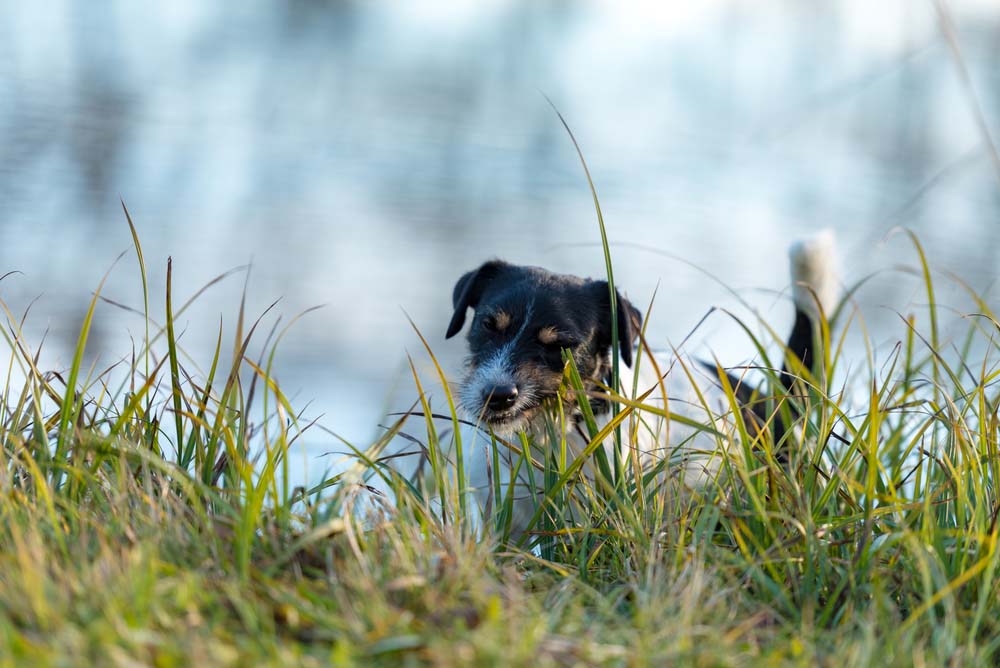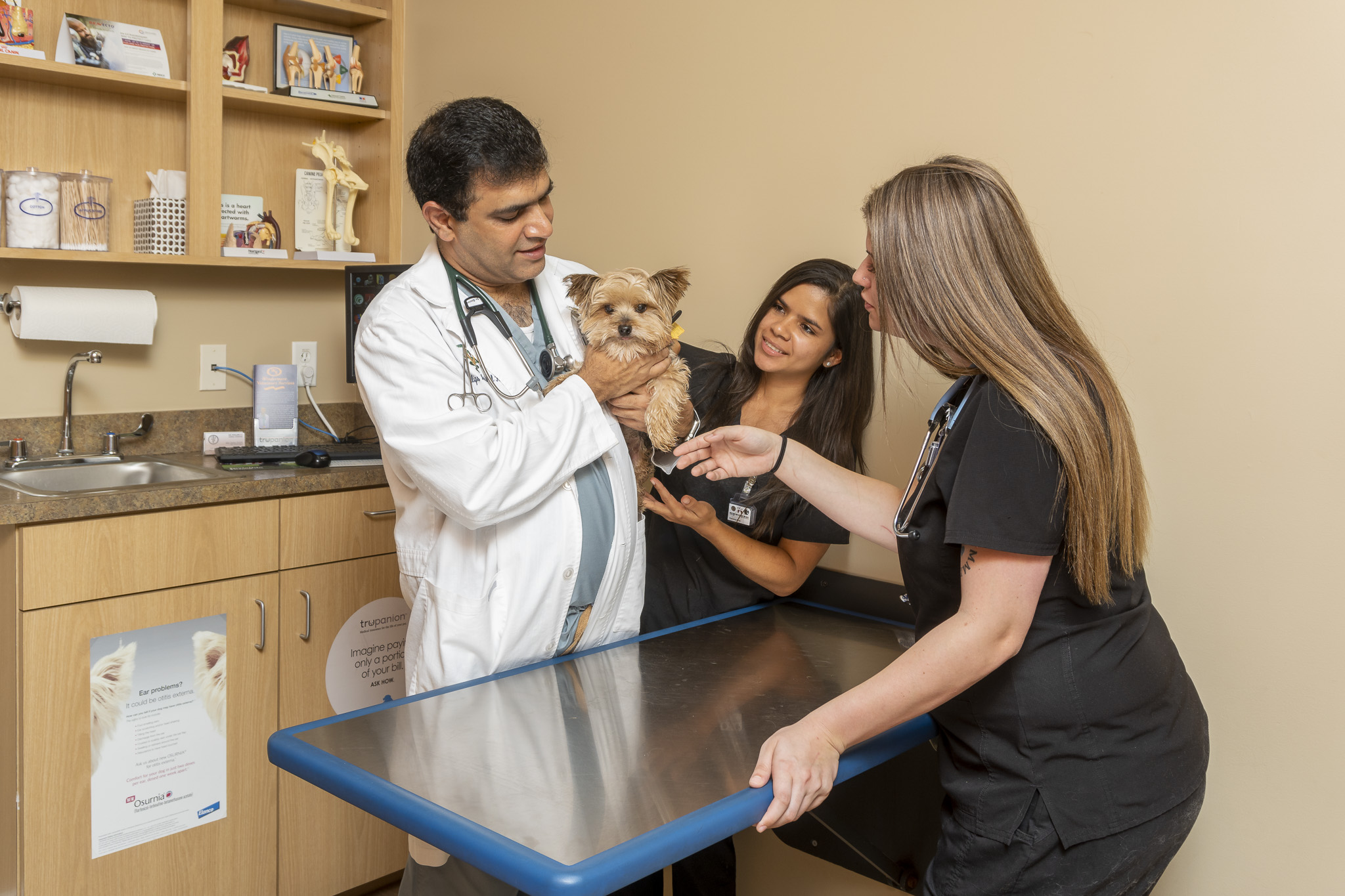
We're here for you
Emergency?
If your pet is exhibiting concerning symptoms or experiencing a medical emergency, please call our clinic at (407) 352-2579. We’ll help you through it.

Dogs are curious creatures. When they’re outside, they may start to nibble grass out of pure entertainment, or maybe they are eating out of nervous behavior. While eating grass for many dogs is no cause for concern, in some dogs it may be a sign of an underlying medical condition or lack of nutrition in their diet. Grass can be soothing on the stomach, so it’s important to watch out for any behavior changes in your pet.
Before making assumptions about your dog’s grass-eating behavior, it’s important to rule out any serious conditions first. Consult with your local vet about any troubling symptoms and they can walk you through possible causes and solutions.
Common Reasons Dogs Eat Grass
The following are some reasons your pet may be eating grass:
- Nutritional Deficiency: A lack of minerals and nutrients in a dog’s diet can lead to some dogs seeking out alternate sources of nutrition by eating grass.
- They Enjoy the Taste of Grass: Believe it or not, many dogs simply enjoy the taste of grass. It may be the different crunchy texture to munch on, unlike much of the store-bought pet food they normally eat.
- A Health Condition: One health condition called Pica may be the culprit for chewing grass. This occurs more frequently in younger dogs and is usually a behavioral response that triggers unconsciously eating or chewing things without any nutrients.
- Sour Stomach: If a dog is feeling sick and has symptoms such as an upset stomach or nausea, they may start eating grass as an instinct to try and flush their system of any bad bacteria.
- Playfulness: Sometimes while dogs are outside, they may simply be trying to start a game if they are playfully eating grass, or trying to “attack” the grass.
- Boredom: Dogs can get bored just like people. If they aren’t napping, playing, or keeping guard, they may start eating grass simply because they have nothing else to do.
- Anxiety: Similar to boredom, dogs may eat grass when they feel anxious. It’s the equivalent of a human picking at their nails or binging on some popcorn when they feel a sense of unease.
- Fiber Intake: Dogs need adequate amounts of vitamins and minerals, and they especially need fiber to help with their digestion. Grass can help keep a dog’s digestion regular.
How To Stop Your Dog From Eating Grass
Eating grass may not be what you want your dog to be doing. The following four steps are some methods you can use to address the problem and prevent your pet from eating too much grass.
Step #1
Take Your Dog to the Vet
The most important thing to do if your dog is eating grass is to rule out any potential medical issues. If your dog has suddenly started eating grass frequently, book an appointment outside of your regular vet visits to make sure they haven’t become sick with a serious medical condition. A vet can provide testing and diagnostic tools to be sure there isn’t a serious root cause, and if a medical condition is the cause of the grass-eating, a vet can recommend specific treatment remedies.
What Medical Conditions Can Cause a Dog To Eat Grass?
These following medical conditions may be the reason your dog has suddenly started eating grass:
- Inflammatory Bowel Disease: Conditions such as inflammatory bowel disease (IBD) can lead to uncomfortable gastrointestinal symptoms like abdominal pain, vomiting, weight loss, or diarrhea. With these uncomfortable symptoms in IBD, a dog may start eating grass to try and make their stomach feel better.
- Pancreatitis: Inflammation of the pancreas can cause digestive upset and may influence a dog's eating habits, leading them to consume grass.
- Gastric Reflux: Gastric reflux occurs when intestinal fluids come up into the esophagus. This build-up of acidity can cause uncomfortable chest pain, and dogs may start eating grass in an unconscious effort to “detoxify” their intestines.
Step #2
Feed Your Dog a Balanced Diet
If your dog is starting to eat grass more than usual, check on the quality of their diet. Perhaps it is time to invest in high-quality, nutrient-dense food to keep your dog healthy and satisfied.
Step #3
Increase Your Dog’s Physical Activity
Sometimes dogs need a little extra stimulation, both mental and physical. Eating grass could be a signal that your dog simply needs more exercise, so go ahead and take them on a walk, out to a dog park, or start up a game of tug-of-war back home.
Step #4
Distract Your Dog When They Start Eating Grass
If you notice your dog eating grass out of anxiety or boredom, an easy fix is to call their name and get them distracted. While eating grass isn’t inherently bad, if it bothers you simply spark their attention with a new toy (or even a new treat).
When in Doubt, Always Contact Your Vet
If your dog continuously eats grass, always contact a vet first and foremost to eliminate any possible serious causes. More often than not eating grass isn’t serious, however, it’s better to be safe and certain that your pet isn’t developing any uncomfortable conditions such as IBD. A vet can walk you through any possible causes, help you get to the bottom of it, and provide next steps at home for you and your dog.

Step One:
Call us to book your pet’s appointment.

Step Two:
Our expert vet will take care of all of your pet’s needs.

Step Three:
Get back to enjoying your happy and healthy life with your furry best friend.

Get the Best Care for Your Pet
Come Visit Dr. Qasim
Book your pet’s appointment with Dr. Qasim to ensure a long, happy life together.

We love and care for each patient as if they were our own pet.
Meet Our Team of Animal Lovers
Dr. Bilal Qasim, DVM, established Dr. Phillips Animal Hospital in 2011 after practicing veterinary medicine for over 17 years with the help of talented and caring veterinary technicians.


